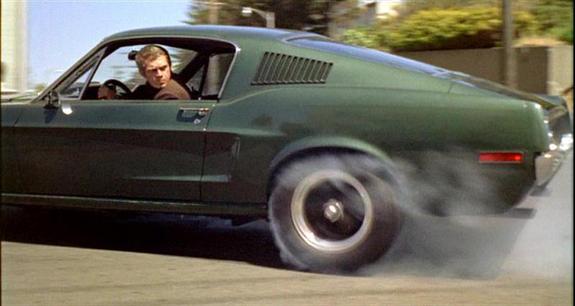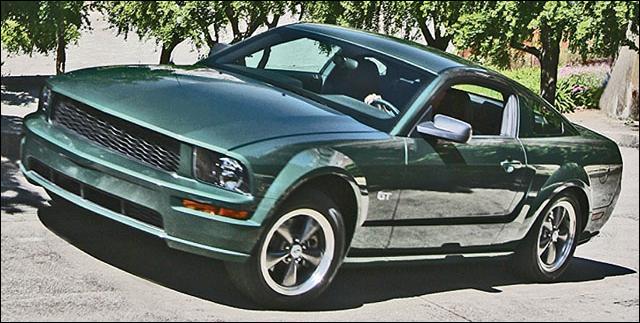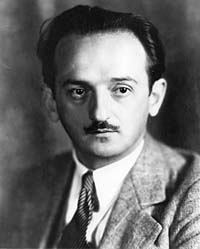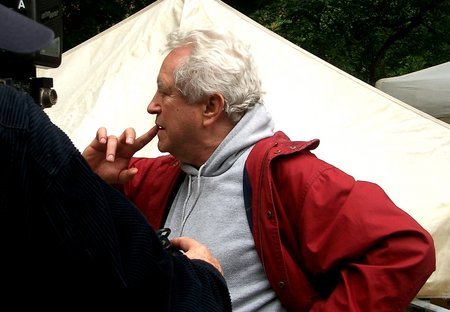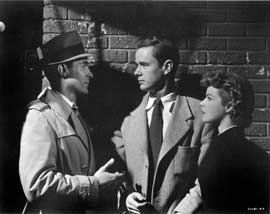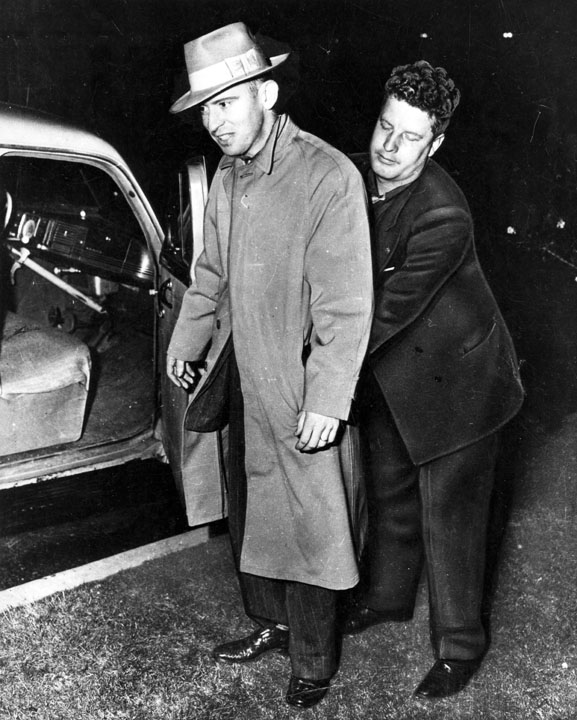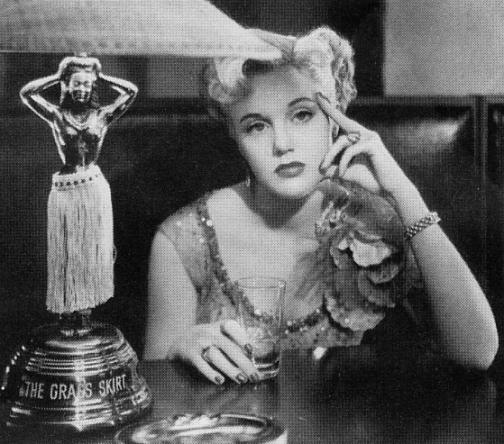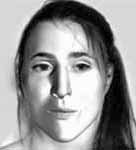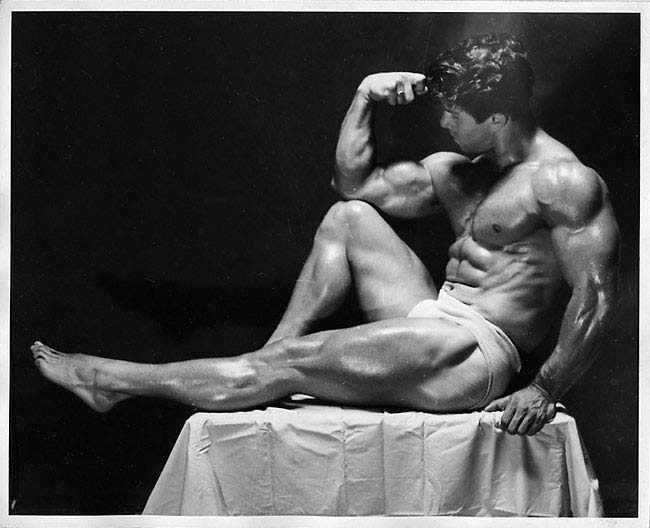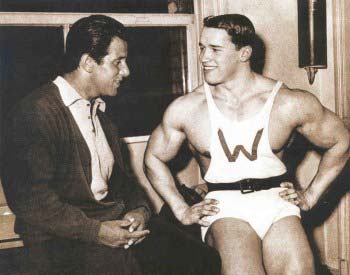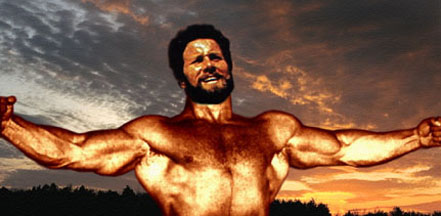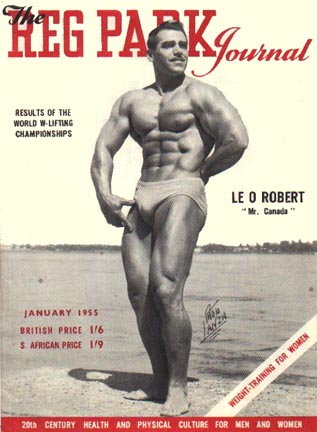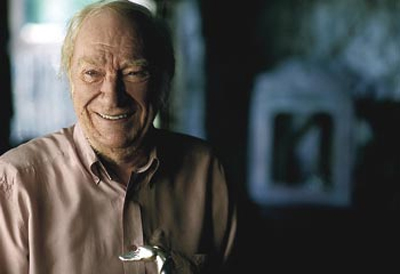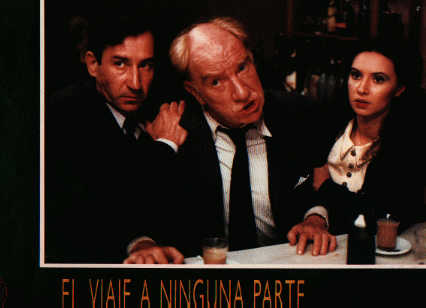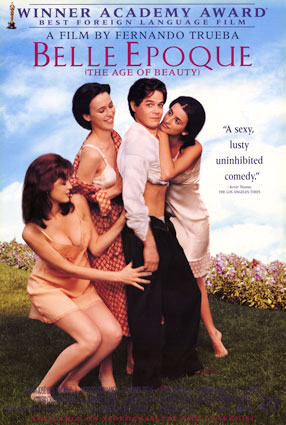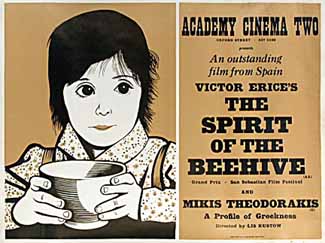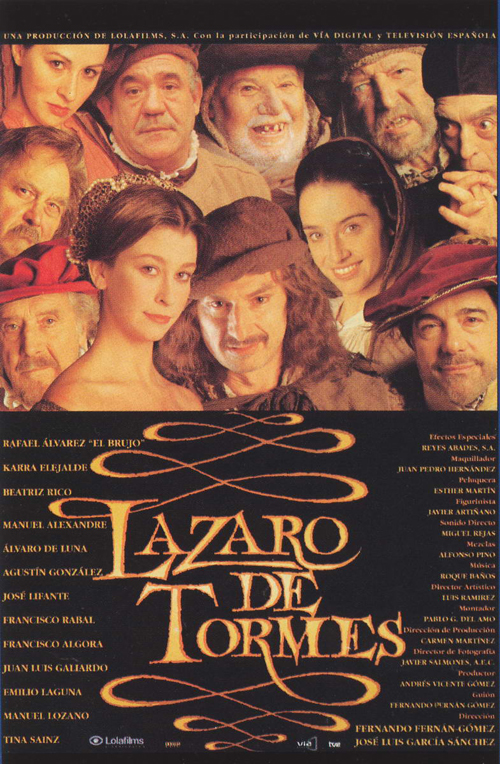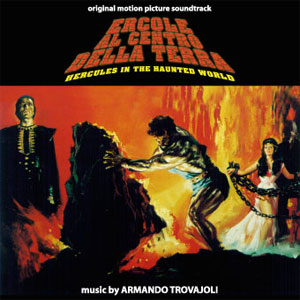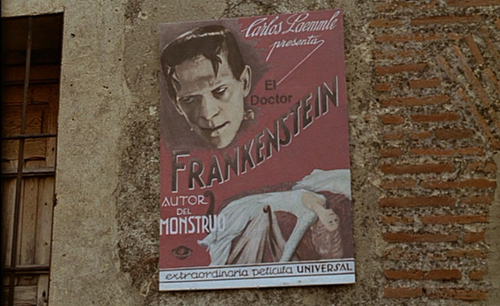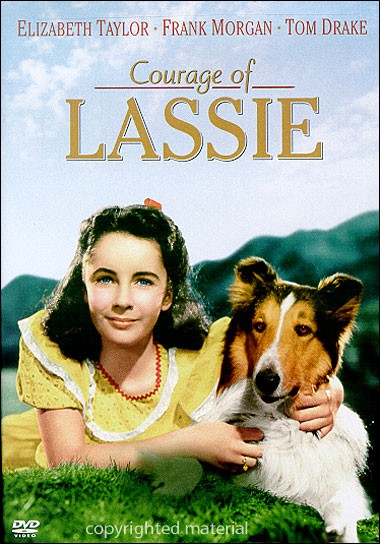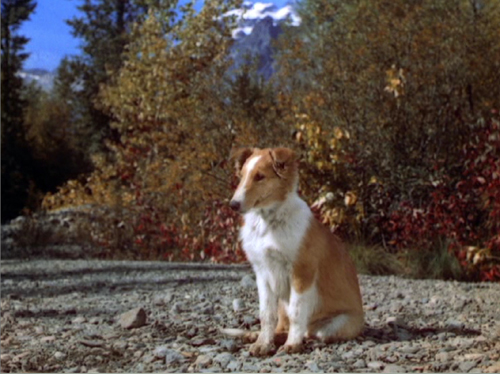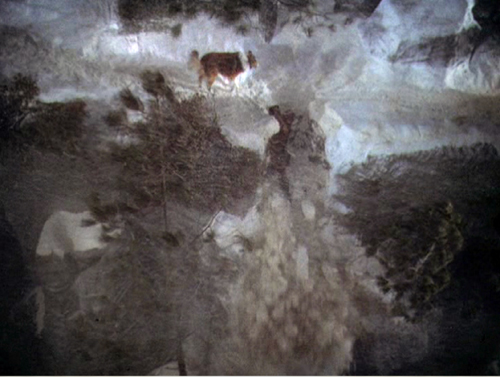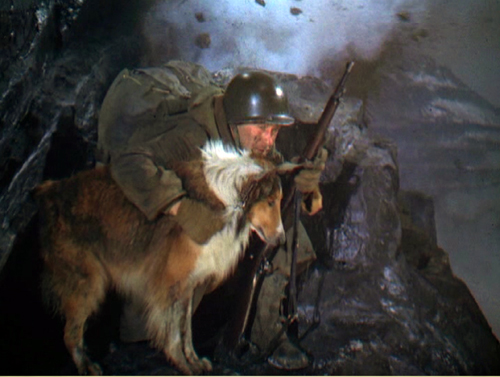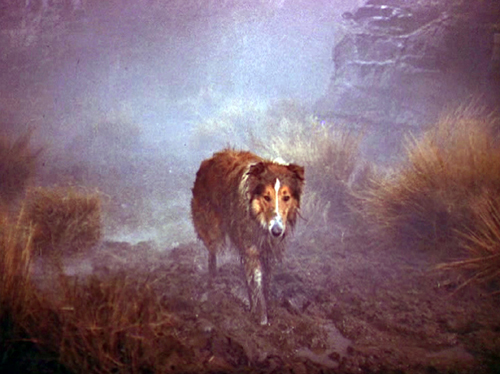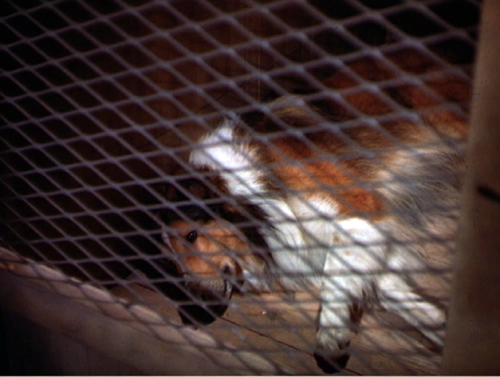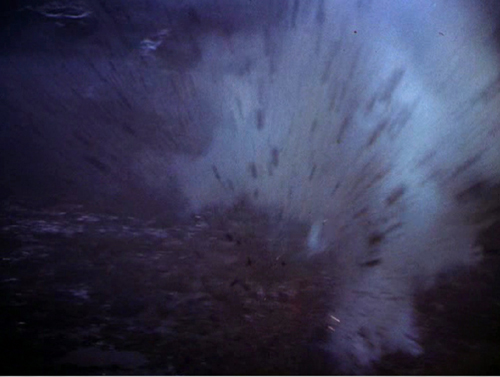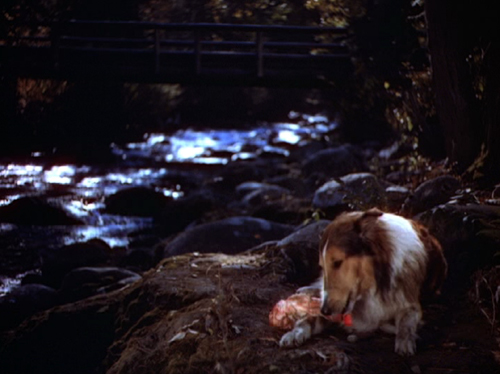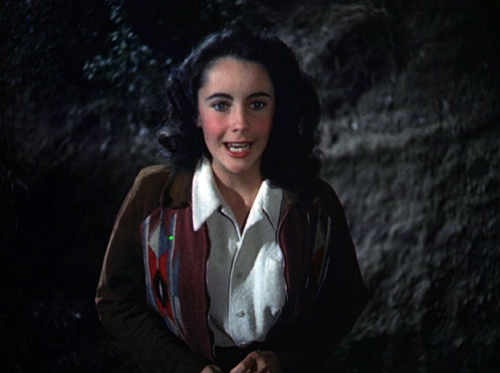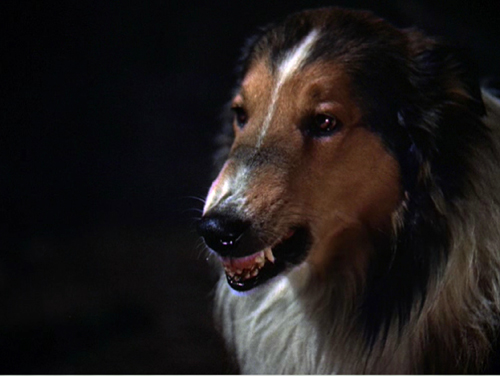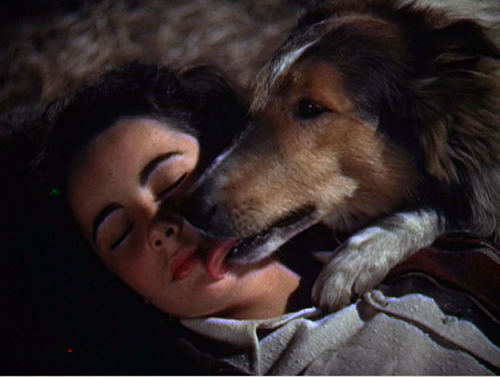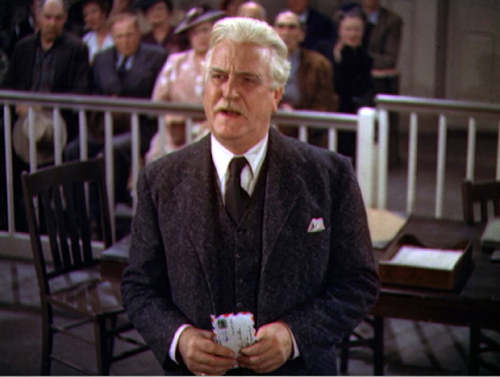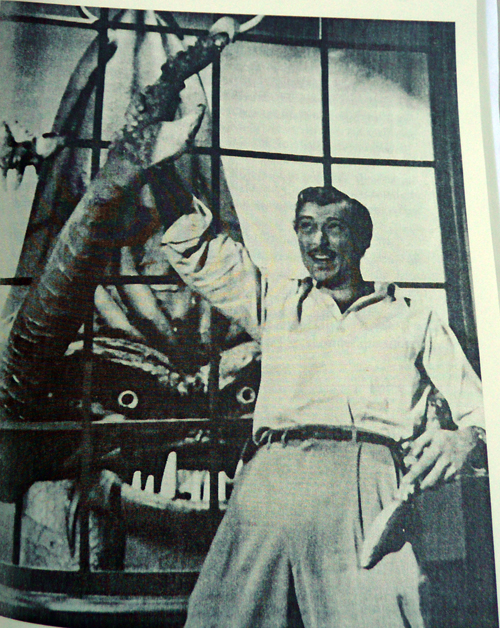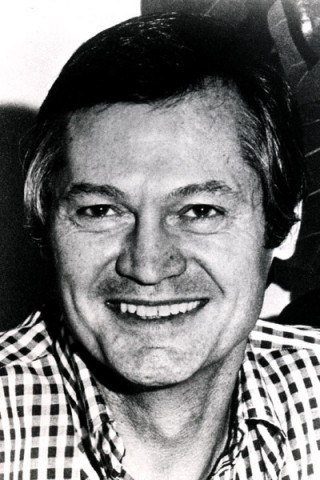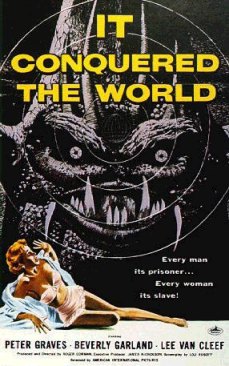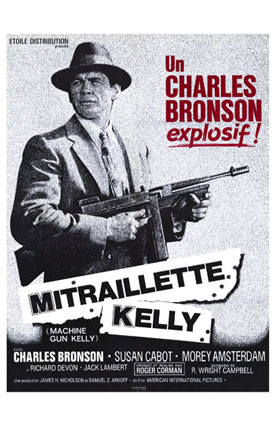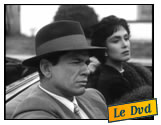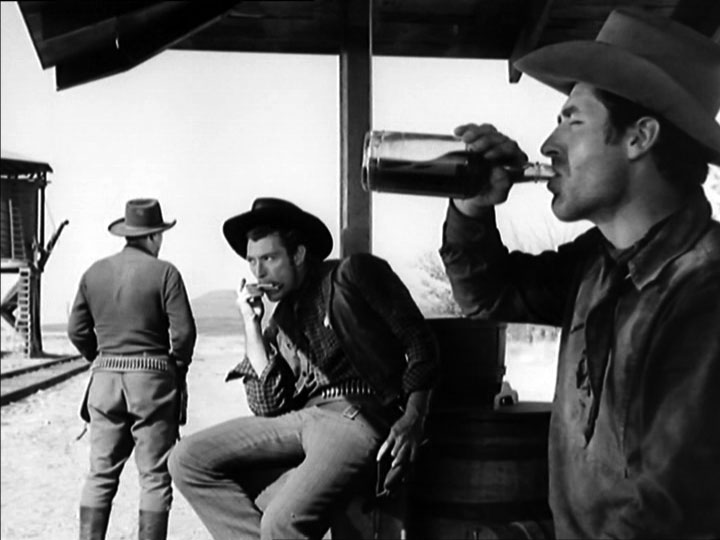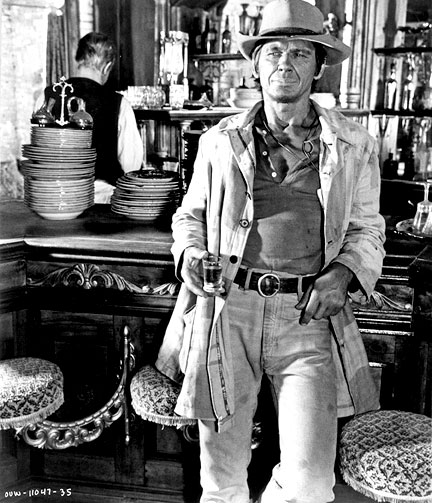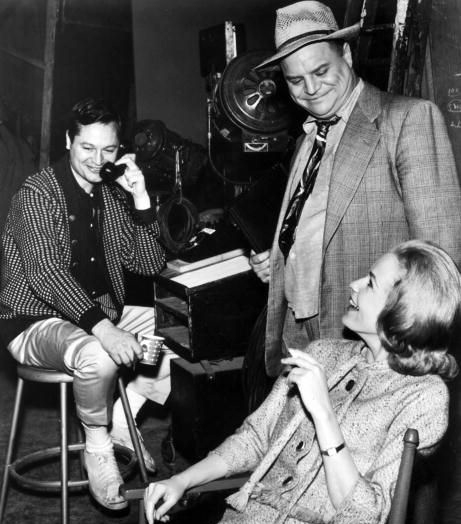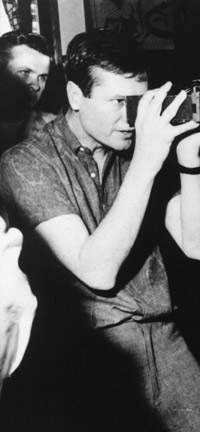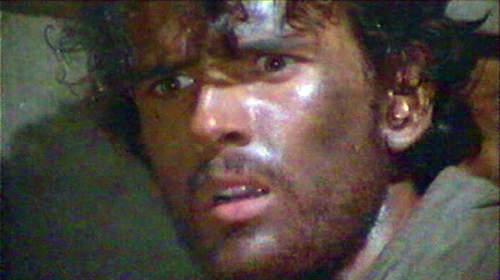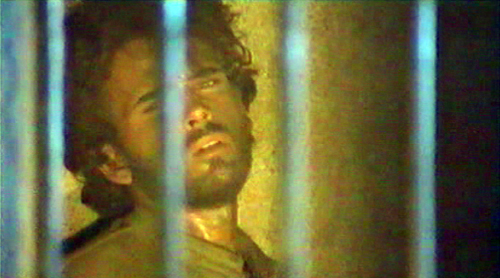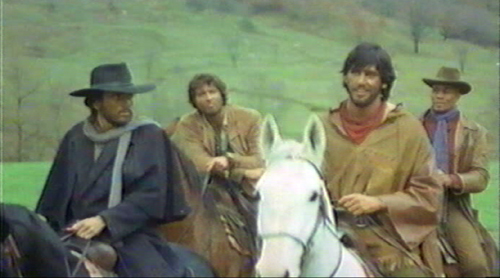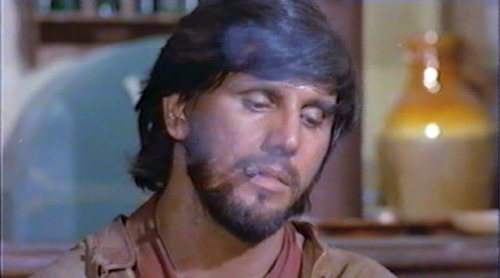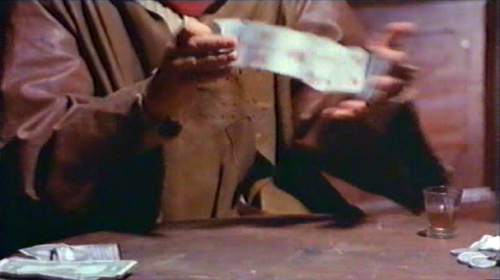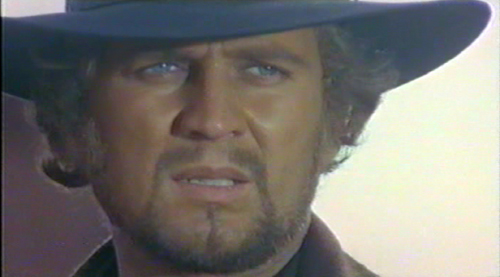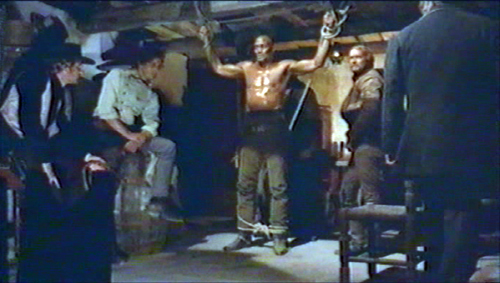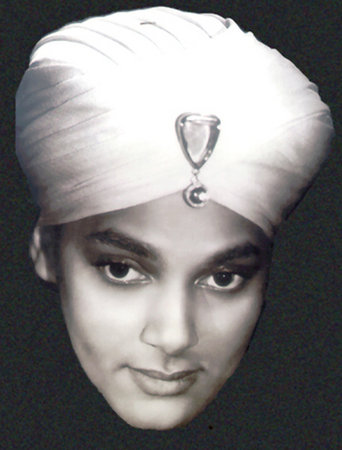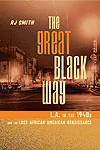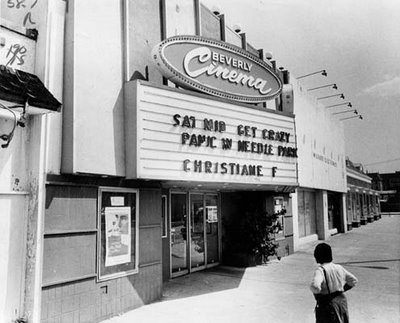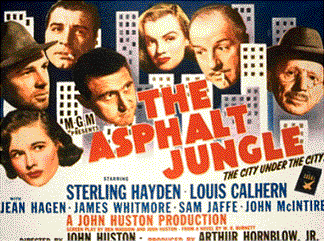
I watched The Asphalt Jungle again after not seeing it for a long time. It’s an influential movie. Especially to Jean Pierre Melville. It might even be his favorite film.

A Street Out Of Melville
The DVD was part of a film noir collection and include some interesting extras, first was an introduction by the man himself, John Huston. It must have been filmed right after the film was made, it’s in B+W and Huston looks like he’s in his late 40’s. He says the movie is all about the characters, summing up with something like ” you might not like them but I think you’ll find them fascinating”. Now that’s my kind of movie!
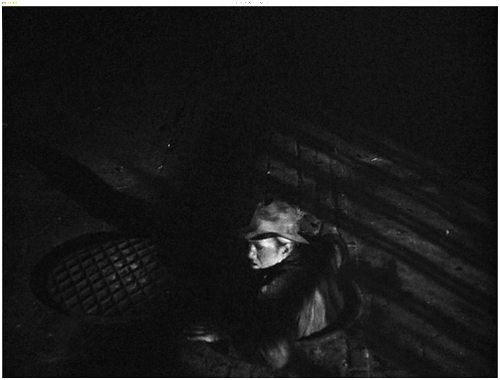
The City=Hell
And the movie really is all about the characters, the way it’s filmed, the action, the details, it all serves to illuminate these beings, their strengths and their weaknesses or “Vice”. From the opening frames, the MGM logo with the roaring lion, the music creates a sense of foreboding, dread. The score is by Miklos Rozsa, it sets the mood and then there’s almost no score until the end. But it works very well. Melville did not use much music in his crime dramas, perhaps influenced by this. The first scenes are shot early on a foggy morning in what looks like Bunker Hill. “Crook Town” according to Raymond Chandler. A patrol car prowls the streets like a rouge shark hunting for the scent of blood. A figure ducks behind a pillar, it’s Dix, the magnificent Sterling Hayden in what I believe is his greatest role.
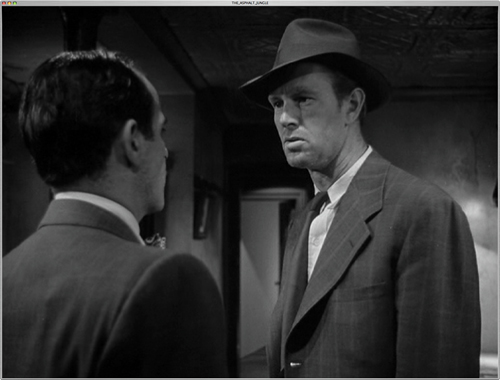
He’s One Intimidating Fellow
He’s pulled in by the cops and put in a line up. But he intimidates the eyewitness, staring him down with murder in his eye, and the corrupt cop can’t out intimidate the guy so Dix walks. We are introduced to a group of criminals, an underworld association of safe crackers, wheelmen, hooligans, brains, bookies, and a high priced mouthpiece.
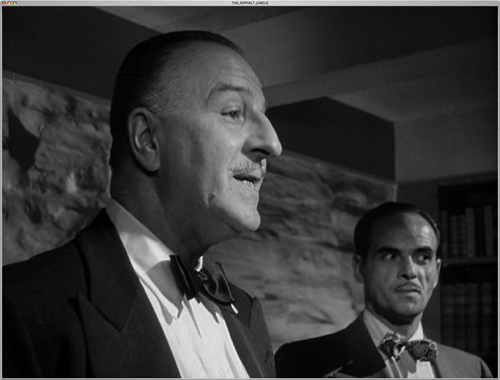
Lon The Mouthpiece and Cobby The Bookie
Also a rough police commissioner, he tears up the corrupt Lt. Ditrich’s ass in an early meeting. I can’t help compare this angry top cop to the Inspector in Melville’s Le Circle Rouge. But the Inspector is more cynical, sure everyone is corrupt while the american is still believing in some, still naive in a way that feels distinctly american. Dix to me is the hero of this piece. He is the post war, traumatized American male. He dreams of the Kentucky horse farm he grew up on. How great it was, his only goal in life is to get enough money to buy it back and to do that he must struggle in the dirty city, the asphalt jungle.

Doll loves Dix, The Only Guy Who Treated her Square
He tells Doll, his taxi dancing girlfriend, of his life back in Kentucky, of a particular Black Colt, the best horse they ever raised, and how everything went bad one year, the corn crop failed, the colt broke his leg and had to be shot, and his father died whereby they lost the farm. He is every American, naive, not understanding the horror that can overtake them at any moment. I’m referring to WWII and the devastating effect it had on our collective psyches. Dix just wants to get back home but as Doc Riedenschneider and Thomas Wolfe would tell him, you can’t go home again. Home to Dix is innocence, clean water, air, 30 acres of blue grass, heaven.
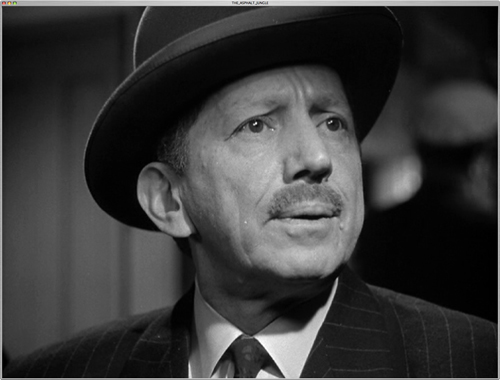
Doc, The Big Brain
Anyway this is a caper movie , a brilliant plan by the “Doc” (Sam Jaffe). Interestingly played as a German complete with accent. A mastermind, he’s figured out this heist down to the smallest detail. Unfortunately when you add violence to the mix, things can go wrong and they do. Huston keeps the action simple and real. I love his fight scenes. My favorite is the bar fight in The Treasure Of The Sierra Madre, when Bogie and Tim Holt take on Barton MacLane. You feel the struggle, the brutality just like a real fight, it ain’t pretty.
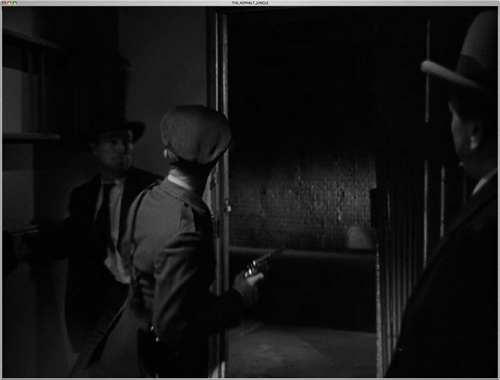

Dix Slugs The Watchman, His Gun Hits The Floor and Goes Off. The Safecracker with a New Baby catches it in the Gut. Just Unlucky, I guess.
The Doc’s vice is chicks, young, beautiful babes. Huston sets this up with a revealing detail. Doc can’t help scope a girly calendar when left alone in the bookie joint.

Doc’s Vice
James Whitmore plays Gus, the hunchback wheelman. He likes Dix, going out of his way to pay Dix’s gambling debt, to keep Dix from pulling another heist.

Gus The Hunch Loves Cats
Louis Calhern is Uncle Lon, the crooked lawyer that lives beyond his means and Marilyn Monroe is Angela, Uncle Lon’s plaything. Man is she sexy, just the way she shifts around on a divan makes your temperature rise.

Marilyn Sleeps On Uncle Lon’s Couch
The movie is shot beautifully. A lot of low angle two shots with one character in the foreground that show the ceiling of the room, creating a claustrophobic sense of everyone being trapped in little boxes, Dix’s room, the bookie joint, Gus’s luncheonette. Greg Toland and Orson Welles shocked the film world by showing ceilings in Citizen Kane. Sets were usually built without ceilings, a throwback to silent days when light came from glass roofed studios. Huston took that idea and ran with it. Maybe the ceiling represents the city, especially to Dix who grew up on a farm, outdoors with the sky for a roof. Harold Rossen did a great job, so atmospheric. It’s true Noir camerawork, with characters facing the camera as another speaks behind them. Rossen was nominated for an Oscar for Cinematography but lost out toThe Third Man! Gee, were movies better then?
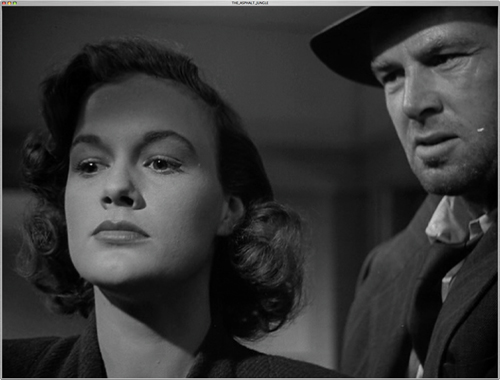
Classic Noir Composition
And as the film progresses and the only characters still on the loose are Dix and Doll, Huston moves into Close Ups.
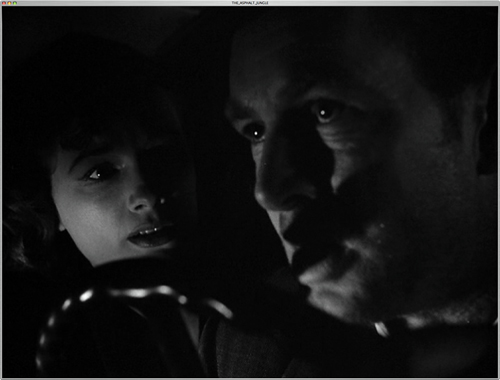
Huston moves in closer
Now that he’s got the audience invested in these people he shoves them in your face. It works like gangbusters.
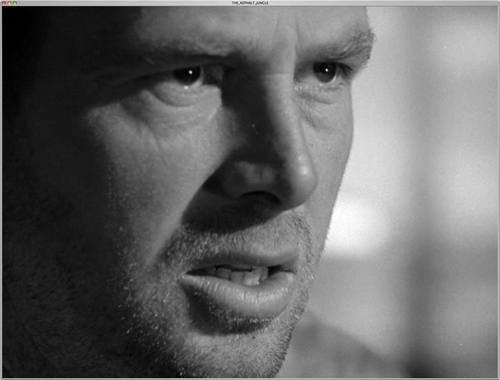
And Closer
Another thing, watch the heist carefully. Where another director would focus on the drill bits and tools, Huston keeps us on the faces, the heist is portrayed purely through character.
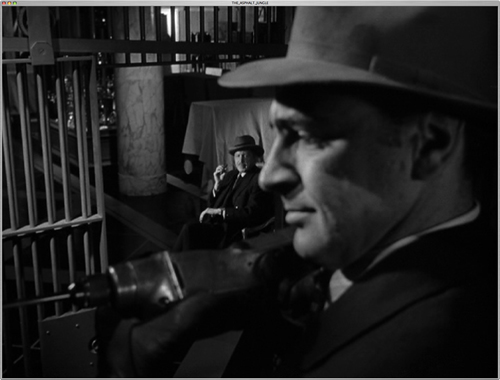
The Heist Plays Out In Faces
There are a lot of little details about everybody that creates more 3 dimensional beings out of them. The fact that the safe cracker just had a baby, that Gus loves cats, that Lon has a sick wife. Backstory for everyone. The sets are great too, bare lightbulbs, pints of whiskey, dirty glasses. It gets under your skin. There’s a street at the begining that looks exactly like one in Melville’s Le Samourai. This nighttime world of people knocking on each other’s doors at 3AM, Melville’s milieu. Also, horses play a big part in Huston’s films. Reflections In A Golden Eye and The Misfits come to mind immediately. Towards the end of Le Doulous Belmondo stops off at a barn and checks out his horse before heading up to the main house where his killer is awaiting him. Is this an homage to Huston’s horse obsession? Quentin Tarantino has said that Melville did for the Crime Film what Leone did for the Western. I guess so, took elements from the Hollywood films they admired, stylized the heck out of them and revitalized a genre. This is one of Huston’s top two films, the other being The Treasure Of The Sierra Madre. In the end Dix makes it back to his farm, he gets to lie in the green grass under the beautiful sky surrounded by the horses he loved.
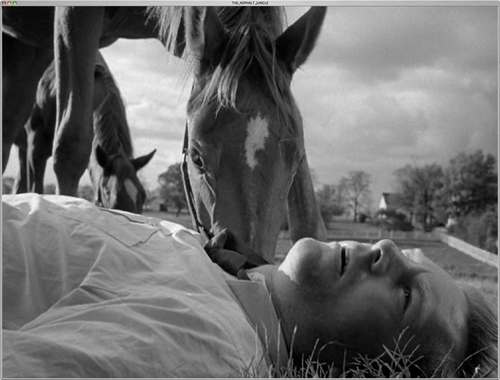
He Loved Horses More Than Anything
But he had to pay a high price, the price we all have to pay to get to Heaven.

Heaven
